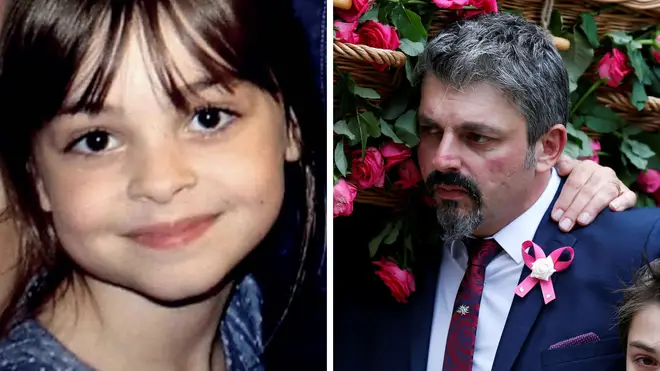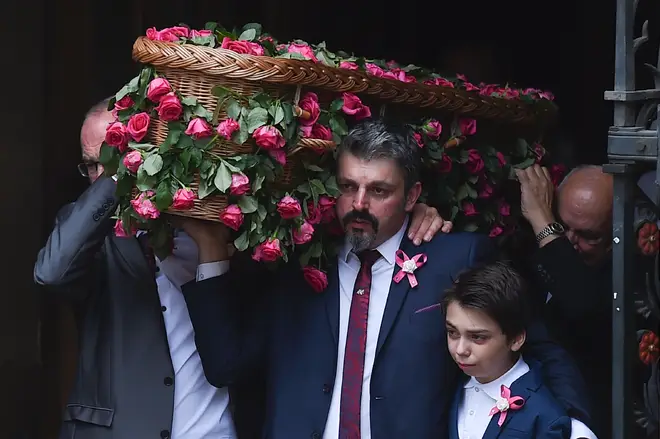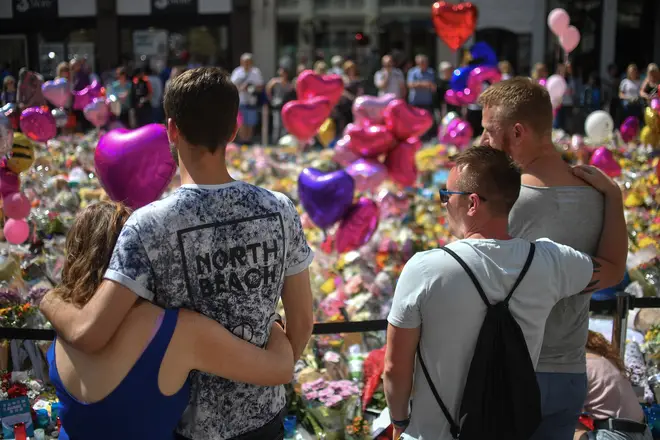
James O'Brien 10am - 1pm
2 March 2023, 13:44

The father of the youngest person to be killed in the Manchester Arena terror attack has claimed MI5 have "blood on their hands".
Saffie-Rose Roussos, 8, was one of 22 people killed by a shrapnel-filled bomb set off by Islamist terrorist Salman Abedi at an Ariana Grande concert in May 2017.
Her father Andrew has spoken out ahead of the release of the final report on the terror attack today, claiming the security services let Abedi "slip through the cracks". Abedi had been known to Mi5 for three years before the attack.
MI5 bosses gave evidence to the inquiry behind closed doors on the circumstances leading up to and surrounding the atrocity between September 7, 2020 and February 15, 2022.

Inquiry chairman Sir John Saunders' report will also focus on the radicalisation of Manchester-born Abedi, 22, who was of Libyan descent, and the planning and preparation of the attack.
The terrorist became a subject of interest (SOI) for MI5 because he had been in phone contact with another SOI - but his case was closed four months later when he was deemed "low risk".
Abedi was identified as being in direct contact with three SOIs between December 2013 and January 2017.
One was suspected of planning to travel to Syria, one had links to al Qaeda and the third had links to Libyan extremists.

Abedi was identified as a contact of a contact of three more SOIs between April 2016 and April 2017. All of them had suspected links to ISIS.
MI5 were given two more pieces of information about Abedi, but agents decided they were not related to terrorism and did not pass them onto police.
A later review found in retrospect that the information could be seen to have been very relevant to his later attack.
Mr Roussos said: "Salman Abedi should have been stopped before he got to that arena and that's MI5's job.

Manchester Arena victim: Hashem Abedi 55 year sentence isn’t enough
"They know the threat, they know what these people do and don't do, they know where to look and not to look, and they were more prepared than what Manchester was that night - so MI5, for me, have got blood on their hands," he told Sky News.
Mr Roussos added: "I want them to admit that with all the signs and what they knew about this family and Salman Abedi that they let it slip through the cracks, because they did."
Abedi's name also hit a "priority indicator" during a separate "data-washing exercise" as falling within a small number of former SOIs who merited further consideration. A meeting to consider the results was scheduled for May 31 2017, nine days after the bombing.
During the inquiry, a number of MI5 witnesses - including a senior officer known as Witness J - and detectives from North West Counter Terrorism Police gave evidence behind closed doors.
The secret sessions were held so as not to compromise national security and the inner workings of MI5 and counter-terror police. A summary of some of the evidence was later made public, but the "gist" did not reveal any further details about the intelligence received by M15 in the months before the attack.

How two brothers spent four months planning Manchester Arena bombing
The scathing second stage of the inquiry found in November 2022 that emergency services could have done more to keep Saffie-Rose and another woman alive.
Saffie-Rose did not die for an hour after Abedi's bomb exploded. Mr Roussos said he did not accept the emergency services' apologies.
It comes after retired judge Sir John found in another stage of the inquiry in June 2021 that security company Showsec, the arena’s operator SMG, and the British Transport Police (BTP) were "principally responsible for the missed opportunities" on the night of the attack along with individual failings.
Jonathan Hall, the independent reviewer terrorism legislation of Hall, told LBC that there were “inexcusable errors” adding: “You have other inquests like the Fishmongers’ Hall inquiry where the failures are really to put together information, to combine information from MI5, from probation, prisons and the like."
"Here it wasn’t about a failure to combine information, it was a failure to see what was actually there."“That’s the real lesson for me which is that sometimes stopping terrorism is about seeing what is there in front of you and what happens at ground level”
One of the individual failings Sir John found was that a guard was afraid to report Mr Abedi for fearing of seeming racist.
Mr Hall said: “I think that’s about confidence. We can all see that you might spot someone and think ‘oh look, they look suspicious’.
"It then requires the confidence to go and report it and I think the absence of the police on the ground was really serious from that point of view because even if an individual might find it hard to tackle another member of the public, they could have gone to the police who do have that confidence".